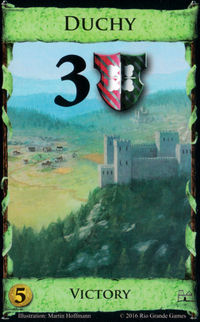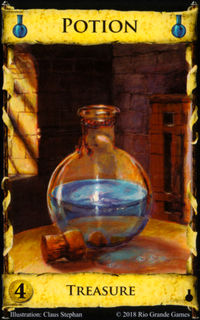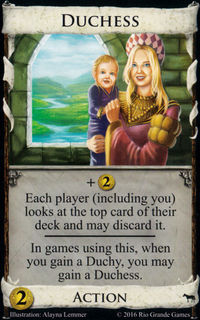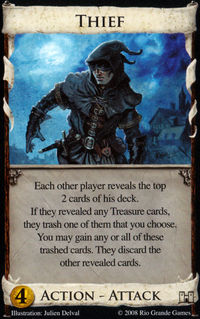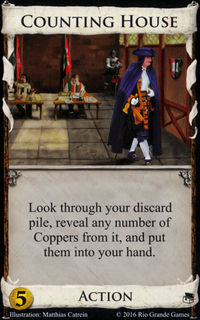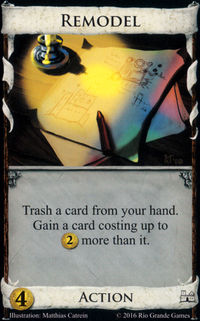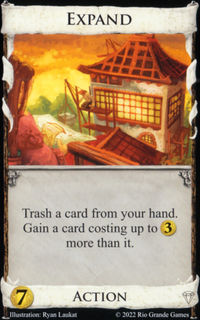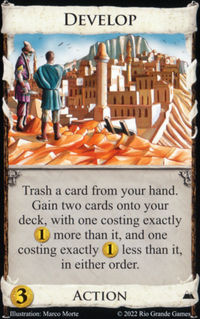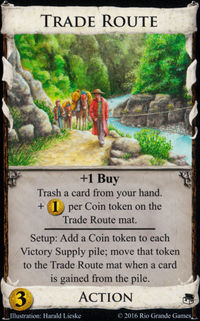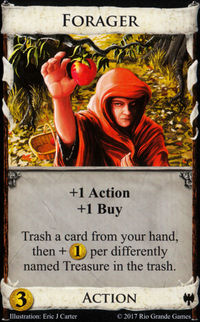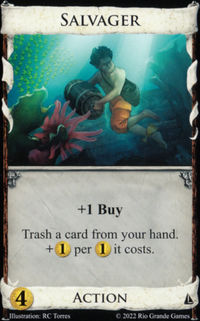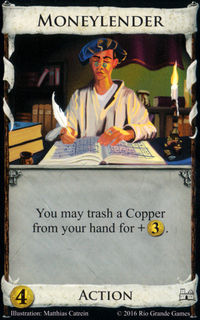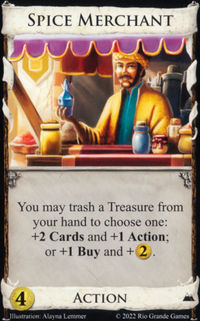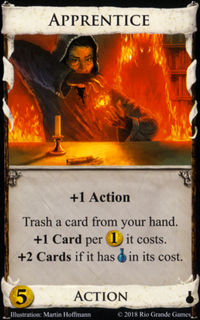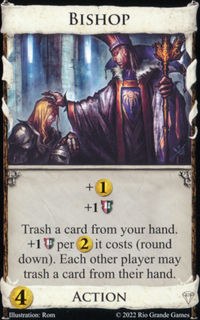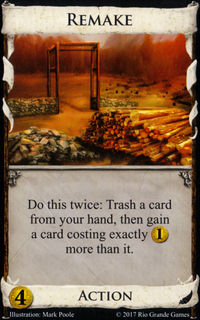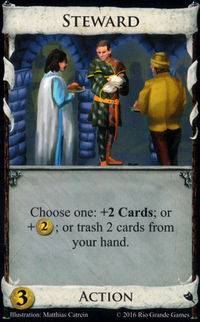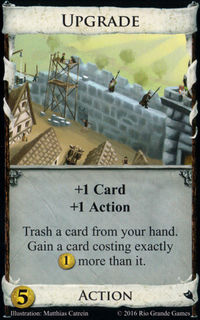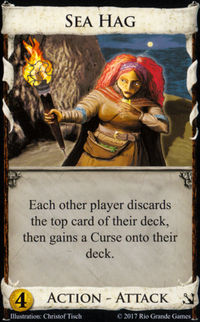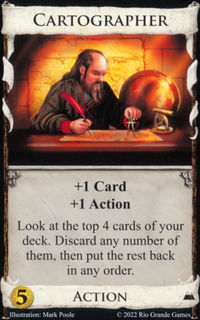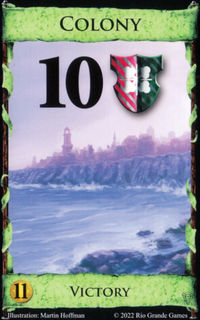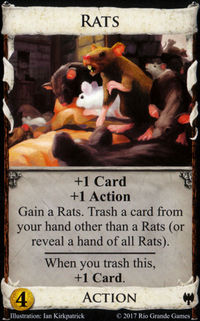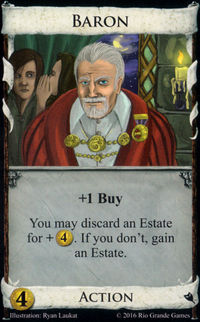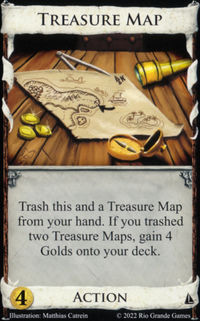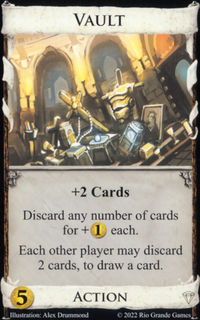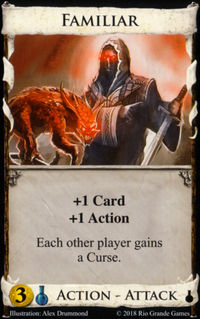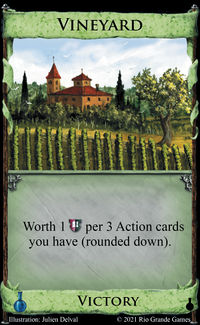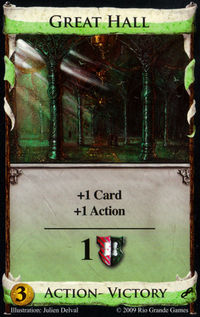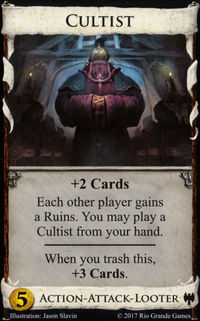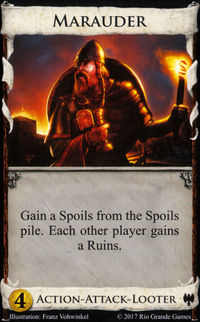Transmute: Difference between revisions
m $0P -> P |
m Transforming Template:Coin to Template:Cost |
||
| Line 38: | Line 38: | ||
So, cards in the Remodel family are generally not for early-game use, but are better in the mid-to-late game, where they can turn mediocre cards into great ones (say Developing a {{card|Sea Hag}} into {{card|Cartographer}}/{{card|Silver}} after the {{card|Curse}}s are gone), or Gold into {{card|Province}}, or burn through the {{card|Colony}} stack to prematurely the end the game with a lead. But, if you take a closer look at Transmute, you’ll see that it doesn’t have the same flexibility as Remodel and Expand, and seems to want to be used more in the early game. You can’t just get anything, you have to take what the ‘Mute gives you, and if you don’t want those things, then you don’t want the ‘Mute. | So, cards in the Remodel family are generally not for early-game use, but are better in the mid-to-late game, where they can turn mediocre cards into great ones (say Developing a {{card|Sea Hag}} into {{card|Cartographer}}/{{card|Silver}} after the {{card|Curse}}s are gone), or Gold into {{card|Province}}, or burn through the {{card|Colony}} stack to prematurely the end the game with a lead. But, if you take a closer look at Transmute, you’ll see that it doesn’t have the same flexibility as Remodel and Expand, and seems to want to be used more in the early game. You can’t just get anything, you have to take what the ‘Mute gives you, and if you don’t want those things, then you don’t want the ‘Mute. | ||
The most immediately appealing use, of course, it to turn your starting Estates into Gold, making the most useless card in most decks into the most useful; it’s also an improvement of {{ | The most immediately appealing use, of course, it to turn your starting Estates into Gold, making the most useless card in most decks into the most useful; it’s also an improvement of {{Cost|4}} worth of value, better than any other trash-for-benefit Action except {{card|Rats}}. This needs to be done early, though, because otherwise you could just buy Gold. If you could pick up Transmute on Turn 1, then you’d have a good chance of turning Estate into Gold on Turns 3/4. That hypothetical card would be a strong but swingy opening in the vein of {{card|Baron}}, which also relies on Estate collision to work. | ||
But you can’t pick it up on Turn 1, because Transmute has that most awkward cost: Potion. You need to open Potion, and then you need to throw away all the rest of the money that came with your Potion on Turns 3/4 to get the Transmute. And by then, your deck has diluted to the point that you’re very likely to draw Transmute with four coppers and wish you had just bought Silver and Gold instead, like your opponent who is pulling down {{ | But you can’t pick it up on Turn 1, because Transmute has that most awkward cost: Potion. You need to open Potion, and then you need to throw away all the rest of the money that came with your Potion on Turns 3/4 to get the Transmute. And by then, your deck has diluted to the point that you’re very likely to draw Transmute with four coppers and wish you had just bought Silver and Gold instead, like your opponent who is pulling down {{Cost|5}} and {{Cost|6}}. Pursuing Transmute early as a source of deck-thinning and Gold gain is, like opening {{card|Treasure Map}}s without strong support, almost guaranteed to fail. The simulators have shown, in fact, that there is no way to add Transmute to an optimized [[Big Money]] strategy and gain advantage. | ||
The other options are even less appealing. Turning Treasure into more Transmutes is obviously horrible on most boards: your terminal density will skyrocket, you’d have better luck just buying stuff with Copper! Turning Actions into Duchies is a better proposition, and actually slots well into late-game use, but even that has its problems. Duchy is fine and all, but it’s no Province, and if you have the Actions to burn, chances are you’d prefer to build up to Province or Colony anyway- in general it’s money decks that want the Duchies more. In addition, you’re still left with the problem that Transmute’s potion cost is really awkward unless you have other desirable Potion cards and/or +Buy: even if you do have an Action chain that needs to grab a bunch of Duchies late, when are you going to go out of your way to get the Transmute? And using Transmute to power a {{card|Duke}} strategy is not usually going to be the best plan: an opponent who has a deck full of Silvers will steal the Duchies underneath you, and have the money left to buy Duke afterwards. | The other options are even less appealing. Turning Treasure into more Transmutes is obviously horrible on most boards: your terminal density will skyrocket, you’d have better luck just buying stuff with Copper! Turning Actions into Duchies is a better proposition, and actually slots well into late-game use, but even that has its problems. Duchy is fine and all, but it’s no Province, and if you have the Actions to burn, chances are you’d prefer to build up to Province or Colony anyway- in general it’s money decks that want the Duchies more. In addition, you’re still left with the problem that Transmute’s potion cost is really awkward unless you have other desirable Potion cards and/or +Buy: even if you do have an Action chain that needs to grab a bunch of Duchies late, when are you going to go out of your way to get the Transmute? And using Transmute to power a {{card|Duke}} strategy is not usually going to be the best plan: an opponent who has a deck full of Silvers will steal the Duchies underneath you, and have the money left to buy Duke afterwards. | ||
| Line 52: | Line 52: | ||
In this company, Transmute does just as well as the rest of ‘em. | In this company, Transmute does just as well as the rest of ‘em. | ||
If you have lots of Curses being flown about, than Transmute will have more targets: not only will it turn Estate to Gold, but if it’s the only way to turn Curse into nothing, that’s worth it too. And with Curses around, the game will slow down: you’re more likely to have {{P}} or {{ | If you have lots of Curses being flown about, than Transmute will have more targets: not only will it turn Estate to Gold, but if it’s the only way to turn Curse into nothing, that’s worth it too. And with Curses around, the game will slow down: you’re more likely to have {{P}} or {{Cost|1P}} hands where you can’t buy anything else, and you’ll also have enough turns such that the slow Estate-to-Gold action is actually worth it. Now if only there was another Potion card that gave out Curses, such that by opening Potion you are gaining access to not only a way to give out Curses, but a way to fix up your own deck too. | ||
Yep. Familiar. Familiar is by far Transmute’s best friend. What’s even better is that, since Familiar is non-terminal, you don’t need to worry about collisions. And once the Curses run out, Familiar -> Duchy ain’t so bad either. I would go so far as to say that whenever you want to buy Familiar, you also want to buy Transmute, since the main contraindication for Transmute that is still relevant in Curse games – strong, multi-card trashing – is also a contraindication for Familiar, which is often too slow against the likes of Chapel anyway. | Yep. Familiar. Familiar is by far Transmute’s best friend. What’s even better is that, since Familiar is non-terminal, you don’t need to worry about collisions. And once the Curses run out, Familiar -> Duchy ain’t so bad either. I would go so far as to say that whenever you want to buy Familiar, you also want to buy Transmute, since the main contraindication for Transmute that is still relevant in Curse games – strong, multi-card trashing – is also a contraindication for Familiar, which is often too slow against the likes of Chapel anyway. | ||
| Line 112: | Line 112: | ||
=== Secret History === | === Secret History === | ||
{{Quote| | {{Quote| | ||
|Text=This slot started out with a Remodel variant that was like the middle ground between two other Remodel variants that hope one day to come out. It seemed like it must be too close to one or the other, so I replaced it with this exotic Remodel. After that the only change to this one was dropping from {{ | |Text=This slot started out with a Remodel variant that was like the middle ground between two other Remodel variants that hope one day to come out. It seemed like it must be too close to one or the other, so I replaced it with this exotic Remodel. After that the only change to this one was dropping from {{Cost|2}}+{{P}} to {{P}}. When the card images were made, the question came up, should this (and Vineyard) have a {{Cost|0}} on it or what? I had never had the 0. My feeling is, if there's no cost to a card at all, you need a 0 where the cost is, to make it clear that you mean for the card to be free. If there's a cost, you don't need that. Transmute has a cost: a potion. It didn't need a 0 too. Anyway we looked at it both ways and both Jay and I preferred it with no 0 and so no 0 it was. | ||
|Name=[[Donald X. Vaccarino]] | |Name=[[Donald X. Vaccarino]] | ||
|Source=[http://forum.dominionstrategy.com/index.php?topic=118.0 The Secret History of the Alchemy Cards] | |Source=[http://forum.dominionstrategy.com/index.php?topic=118.0 The Secret History of the Alchemy Cards] | ||
Revision as of 08:39, 8 November 2012
| Transmute | |
|---|---|
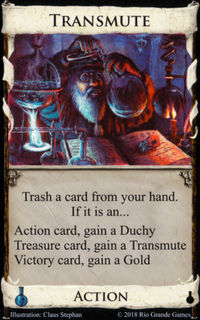
| |
| Cost | |
| Type | Action |
| Set/Expansion | Alchemy |
| Illustrator | Claus Stephan |
| Trash a card from your hand. If it is an… Action card, gain a Duchy; Treasure card, gain a Transmute; Victory card, gain a Gold. | |
Transmute is an Action card from Alchemy. It is an exotic remodeler which turns Actions into Victory cards, Victory cards into Treasures, and Treasures into Actions. However, since the cards it gives you are fixed (Duchy, Gold, and Transmute itself), it has fairly limited utility.
FAQ
Official FAQ
- If you have no cards left in hand to trash, you do not get anything. If you trash a Curse to this, you do not get anything – Curse is not an Action card or Victory card or Treasure card.
- If you trash a card with more than one type, you get each applicable thing. For example, if you trash an Action-Victory card (such as Nobles, from Dominion: Intrigue), you gain both a Duchy and a Gold.
- Gained cards come from the Supply and go to your discard pile.
- If there are no appropriate cards left to gain, you don't gain those cards.
Other Rules clarifications
Strategy Article
Article by chwhite, edited by theory, originally posted on the forum
Is there any card more unloved than Mr. Transmute, with his sad eyes and mountain man beard, futilely trying to turn lead (Estates) into gold? For most people, Transmute is a card whose main ability is showing up dead last in any ranking it’s a part of:
It was the worst Potion card in theory’s front-page ranking. It won a plurality of votes in this forum topic asking for the “worst card in Dominion”, garnering almost twice as many nods as the next most-hated cards at the time, Duchess and Thief. In Qvist’s card rankings, Transmute was not only dead last, but by a nearly unanimous vote. Only one person dared to dissent. And of course, Council Room stats bear out this general theme. Only two cards- Thief and Counting House- have a worse “Win Rate With”, and Transmute is near the bottom of most other metrics as well. So, what gives? Why is Transmute thought of so poorly? Does it deserve all the scorn it gets? And when can it be useful? The fact of the matter is that Transmute is indeed a weak card, since it is so awkward and slow to buy and use. Most of the time, it’s best avoided. However, there are in fact a number of situations where it can be useful: it may not be good, but it’s better than you think.
Why do you usually not want Transmute?
Described by Donald X. as an “exotic Remodel” in the Secret History, Transmute is a trash-for-benefit card that (like most TFB cards) works on only one card at a time. The main thematic conceit of Transmute is that it changes the nature of the card from one type to another: Victory cards become Treasure (always Gold, which is thematically fitting and also the best Treasure always in the game); Treasure becomes Actions (always Transmute, since it’s the only Action always in the game with Transmute), and Actions becomes Victory (Duchy, which again is always out). It’s a cycle!
Like its closest relatives Remodel, Expand, and Develop, the benefit is “more/better cards”. It does not give cash and/or +Buy (Trade Route, Forager, Salvager, Moneylender, Spice Merchant), nor +Card (Apprentice, Spice Merchant), nor is it VP chips and cash (Bishop). All other things being equal, this is the weakest category of trasher there is. If you are trashing early, to thin your deck for an engine, then you really want a card which can get rid of multiple Coppers and Estates at a time, like Chapel/Remake/Steward. Failing that, you’d prefer for the card to give you cash to make good purchases now, as Moneylender/Salvager does, or at least be non-terminal like Upgrade and Apprentice.
So, cards in the Remodel family are generally not for early-game use, but are better in the mid-to-late game, where they can turn mediocre cards into great ones (say Developing a Sea Hag into Cartographer/Silver after the Curses are gone), or Gold into Province, or burn through the Colony stack to prematurely the end the game with a lead. But, if you take a closer look at Transmute, you’ll see that it doesn’t have the same flexibility as Remodel and Expand, and seems to want to be used more in the early game. You can’t just get anything, you have to take what the ‘Mute gives you, and if you don’t want those things, then you don’t want the ‘Mute.
The most immediately appealing use, of course, it to turn your starting Estates into Gold, making the most useless card in most decks into the most useful; it’s also an improvement of worth of value, better than any other trash-for-benefit Action except Rats. This needs to be done early, though, because otherwise you could just buy Gold. If you could pick up Transmute on Turn 1, then you’d have a good chance of turning Estate into Gold on Turns 3/4. That hypothetical card would be a strong but swingy opening in the vein of Baron, which also relies on Estate collision to work.
But you can’t pick it up on Turn 1, because Transmute has that most awkward cost: Potion. You need to open Potion, and then you need to throw away all the rest of the money that came with your Potion on Turns 3/4 to get the Transmute. And by then, your deck has diluted to the point that you’re very likely to draw Transmute with four coppers and wish you had just bought Silver and Gold instead, like your opponent who is pulling down and . Pursuing Transmute early as a source of deck-thinning and Gold gain is, like opening Treasure Maps without strong support, almost guaranteed to fail. The simulators have shown, in fact, that there is no way to add Transmute to an optimized Big Money strategy and gain advantage.
The other options are even less appealing. Turning Treasure into more Transmutes is obviously horrible on most boards: your terminal density will skyrocket, you’d have better luck just buying stuff with Copper! Turning Actions into Duchies is a better proposition, and actually slots well into late-game use, but even that has its problems. Duchy is fine and all, but it’s no Province, and if you have the Actions to burn, chances are you’d prefer to build up to Province or Colony anyway- in general it’s money decks that want the Duchies more. In addition, you’re still left with the problem that Transmute’s potion cost is really awkward unless you have other desirable Potion cards and/or +Buy: even if you do have an Action chain that needs to grab a bunch of Duchies late, when are you going to go out of your way to get the Transmute? And using Transmute to power a Duke strategy is not usually going to be the best plan: an opponent who has a deck full of Silvers will steal the Duchies underneath you, and have the money left to buy Duke afterwards.
So, to review: You don’t really ever want Transmute when there’s faster trashing (which is most everything that’s not Remodel, Expand, Trade Route, and Develop). You don’t want it when there’s a fast Big Money strategy that doesn’t need trashing. You don’t want it if there’s a slow Big Money strategy- you’d rather buy no Kingdom card than Transmutes. You don’t even want it with Dukes most of the time. When would you ever want one?
When do you want Transmute?
Well… the first line of Transmute is “Trash a card from your hand.” Not every card is an Action, a Victory, or a Treasure. The above analysis has so far failed to mention the fourth type of card: Curse. Curses are bad. Real bad. They slow you down, kill your buying power, and your score. You want them out of your deck come hell or high water (well, maybe you can handle them if you have something like Vault, or a zillion Golds, but generally this is true.) They are worse than Estate- and they are so bad that the vast majority of trash-for-benefit cards give you no benefit for them, since getting rid of that Curse is benefit enough. Apprentice gives you zero cards. Salvager gives you zero dollars. Bishop may as well be trashing the empty air. Remodel… very often will force you take an Estate or Copper.
In this company, Transmute does just as well as the rest of ‘em.
If you have lots of Curses being flown about, than Transmute will have more targets: not only will it turn Estate to Gold, but if it’s the only way to turn Curse into nothing, that’s worth it too. And with Curses around, the game will slow down: you’re more likely to have or hands where you can’t buy anything else, and you’ll also have enough turns such that the slow Estate-to-Gold action is actually worth it. Now if only there was another Potion card that gave out Curses, such that by opening Potion you are gaining access to not only a way to give out Curses, but a way to fix up your own deck too.
Yep. Familiar. Familiar is by far Transmute’s best friend. What’s even better is that, since Familiar is non-terminal, you don’t need to worry about collisions. And once the Curses run out, Familiar -> Duchy ain’t so bad either. I would go so far as to say that whenever you want to buy Familiar, you also want to buy Transmute, since the main contraindication for Transmute that is still relevant in Curse games – strong, multi-card trashing – is also a contraindication for Familiar, which is often too slow against the likes of Chapel anyway.
Of course, what makes Familiar such a good partner to Transmute is that it provides the two strongest triggers for a useful Transmute – Curses and other Potion cards which you also want – in one package. There are a handful of such triggers, which either minimize the ‘Mute’s weaknesses, or make its less-useful features more useful. On sufficiently weak boards it might be worth it to go Transmute with only one of those triggers, but normally Transmute needs two or more to really shine. Here they are, with some sample games to show how the Transmute can add value to a surprisingly wide variety of decks:
Trigger 1: Other Potion Cards (Trigger 1a: Familiar)
The big thing about having other Potion-cost cards in the setup is that it drastically reduces the opportunity cost for Transmute, since you want that Potion anyway. If you’re building an engine with +Buy, so much the better, since than you can pick up Transmute with your other cash as well, and +Actions are also useful, to ensure that the ‘Mute can actually be played.
Here is a good example of Transmute fitting into an Alchemy-heavy deck: not just Familiars, but Golem, Apothecary, Alchemist, and Vineyard are all on tap here- and Herbalist for +Buy! Add in Tournament and Fairgrounds, and you have a long, messy, high-scoring game where Transmute is used to good effect on all four types of cards (Action, Treasure, Victory, Curse).
Trigger 1b: Vineyard
After Familiar, Vineyard is the second-best Potion card to pair with Transmute. The reason for this is that Vineyard decks actually want you to go Copper -> Transmute, because then you’re increasing your Action count and pumping your Vineyards; therefore, Transmute will basically always have a useful target. Get one early, and they will be fruitful and multiply.
This match against JimmerFan features both Alchemist and Vineyard, and Pawn for +Buy. The Transmutes are happy to hit Estate early and Copper late, and thus facilitate both Provinces and Vineyards. With Alchemist and Vineyard, the second potion becomes a good idea, further lowering the opportunity cost of buying the ‘Mute.
In this one, ehunt shows how Vineyard-Transmute can even best a strong double-Tac Conspirator deck- his six Vineyards are worth 7 VP each at the end.
Trigger 2: Curse-givers
Familiar isn’t the only Curse-giver which slows the game down enough to make Transmute worth it. Sometimes it can be worth it to get the Potion, to get the Transmute, primarily to clear Curses (but Gold and Duchy is also welcome), on slowish boards. If there are top-notch BM sifters and +Card effects like Embassy, you don’t necessarily want to bother.
Here’s one against WanderingWinder with IGG and Hag, where frankly I erred in not buying the Transmute earlier. This one also had Golem as another reason to buy Potion, and it clears me of all my Estates and Curses. Playing Transmute on Coppers also marginally increases the chance of Menagerie hitting, making it less obviously bad than usual.
Other cards which dramatically slow down the game can sometimes substitute for Curse as a trigger: in situations such as this 3p Ambassador game, everything is slow and junky enough that Transmuting Estates into Gold, believe it or not, was the fastest way to actually get spending power.
Trigger 3: Copper-specific trashing
Once in a rare while, Transmute can actually be half of a dedicated early-game deck-tuning strategy, turning Estates into Gold while another card takes care of the Coppers. This strategy is probably too slow against a strong BM + X that can handle the Estates and Coppers, and is smoked by real top-level trashers. But if, for instance, Colonies are out, the slow start can actually be worth it. Then, in the late-game, the ‘Mute can sneak out a Duchy or two, which is more than you can say for Chapel in most endgames.
This one required opportunistic shuffling, but when you can take the first-turn Mint AND still buy Potion on Turn 3, you are going to have a deck stuffed to the brim with Gold very quickly. A better example is this Potion/Loan opening, which might have been slow for Provinces but was absolutely worth it in the presence of Colony.
Trigger 4: Alternate VPs, especially Duke
In addition to Vineyard and Colony, a couple other alternate VP cards can be a reason to consider Transmute. One possibility which is generally more interesting in theory than practice is dual-type cards: Action-Victory cards give you a Gold and a Duchy, while Treasure-Victory cards give you Gold and Transmute. That “bargain” is basically never worth it for Harem and hardly any better for Nobles, so we can set them aside; but Gold and Duchy for a Great Hall is a better deal, and might be something to be aware of, if you have other reasons to pick up those cards in the first place.
Duke, on the other hand, can sometimes be facilitated by Transmuting Actions into Duchy if the conditions are right. In this game the presence of Curse and an Inn-fueled engine is a boost to this approach, while in this game, Stef builds a massive Action-happy Scrying Pool-Transmute engine which gets the money necessary to buy multiple Dukes on the last couple of turns from… Transmuted Gold.
…
Generally, if at least (preferably more than) one of these triggers are out, and none of the strong contraindications for Transmute are out (basically, superior trashing or a faster-than-usual BM strategy), it’s a card worth considering. Transmute is tricky to play, it’s among the most slow and situational cards in the Dominion universe. But good situations do exist, so cheer up mountain man!
Synergies/Combos
- Familiar, Familiar, Familiar
- Other game-slowing curse-givers
- Alchemy-heavy setups, especially those with +Action and +Buy
- Copper-specific trashing
- Vineyard
- Great Hall, Duke, Colony (sometimes)
- Cultist or Marauder, which might fill your deck with Ruins which you can Transmute into Duchies.
Antisynergies
- Most normal Province games
- Uncomplicated BM strategies
- Alternate VP cards that aren’t Vineyard or Duke
- Superior trashing
- Fast games in general
Trivia
Secret History
